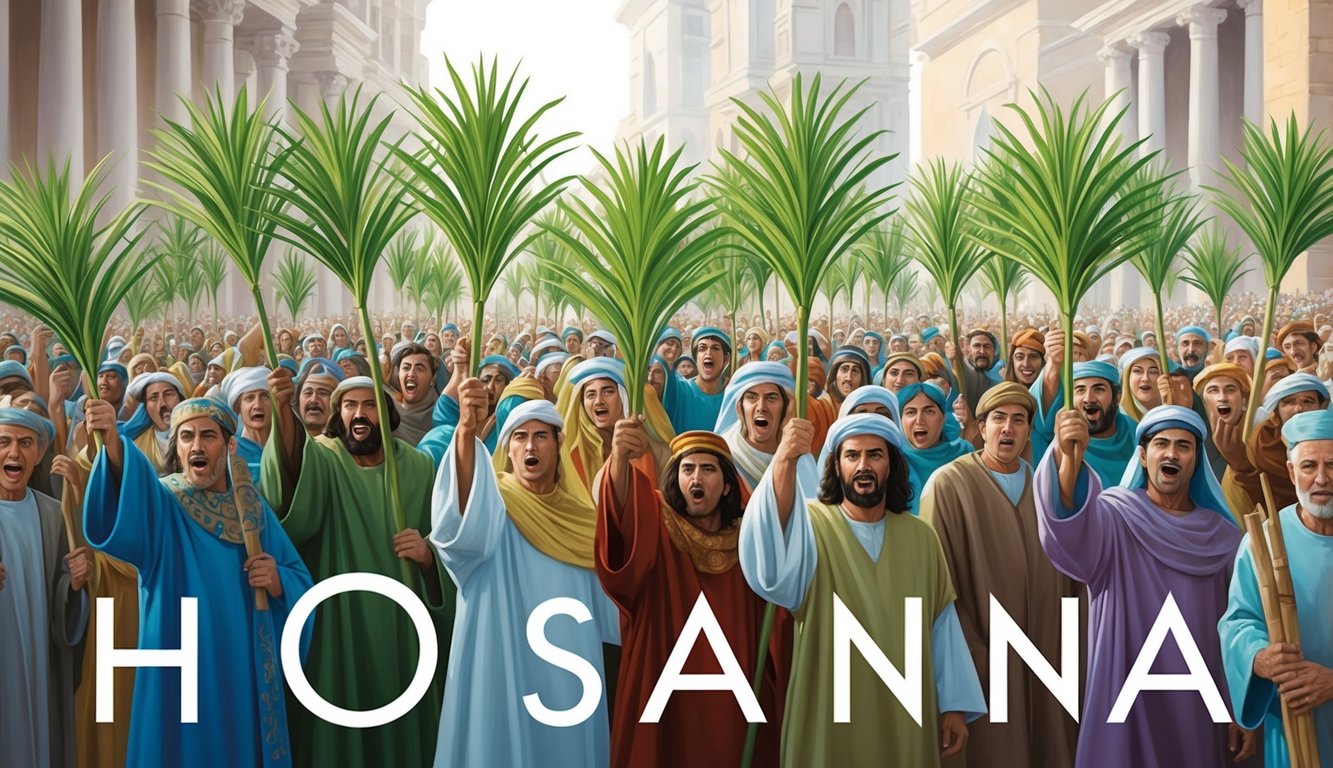Don’t Miss Out On This Unique Astrological Opportunity
Are you tired of spinning your wheels and getting nowhere? Simply put, you’re out of sync: you’re out of alignment with your astral configuration.
But: there’s a kind of map that can help you reclaim your alignment. Think of it as your own personal blueprint to success and happiness: a blueprint that will help you live your most amazing life.
Get started here.
The word “Hosanna” has deeper roots than you might think.
It originates from Hebrew, where it is a cry for help or salvation.
This ancient term has traveled through languages and cultures, becoming a key part of Christian worship.
In the New Testament, “Hosanna” takes on a significant role.
People used it to express praise during Jesus’ entry into Jerusalem, where it symbolized acknowledgment of Jesus as the Messiah. Hosanna means both a plea for help and a shout of praise, showing a profound duality in its use during worship.
Understanding its liturgical significance is key.
In Christian traditions, “Hosanna” is often associated with Palm Sunday and other special services.
It is a word that connects the congregants through shared faith, history, and tradition, adding richness to the experience of worship.
Key Takeaways
- Originates from Hebrew, meaning plea for salvation.
- Expresses praise in the New Testament context.
- Used in special Christian services like Palm Sunday.
Etymology and Original Meaning
The word “Hosanna” originates from Hebrew and underwent changes as it was adapted into Greek.
It is often associated with expressions of praise and salvation.
Hebrew Origin of Hosanna
In Hebrew, “Hosanna” comes from the phrase “hoshi’ah na,” which translates to “please save us.” It is derived from two Hebrew words: yasha (save) and na (please).
This phrase appears in Jewish prayers, notably in the Hallel psalms, which are celebratory hymns.
The phrase reflects a plea for divine salvation and has roots in ancient Jewish culture.
Over time, it evolved from a call for aid to an acknowledgment of salvation already received.
Greek Transliteration and Translation
The Greek adaptation of “Hosanna” remained phonetically close to its Hebrew roots.
Greek did not alter the meaning, as it retained a plea for help.
By the time the word appeared in the New Testament, it was used as a shout of jubilation.
In Greek texts, it is associated with welcoming Jesus during his entry into Jerusalem.
The Greek rendition echoed the sentiments of praise and reverence, aligning with the term’s spiritual and uplifting tone.
Historical Context and Usage
Historically, “Hosanna” has been used in significant religious events, particularly during the celebration of festivals like Passover.
In the New Testament, it is utilized during Jesus’ entry into Jerusalem, marking Palm Sunday.
This usage suggests its dual role as both a request for salvation and a shout of praise to God.
In different cultures and languages, including Aramaic, its significance is tied to expressions of deep spiritual emotion.
The evolution from plea to praise showcases the word’s adaptation over time throughout various religious traditions.
Hosanna in the Christian Faith
In Christianity, the term “Hosanna” holds deep meaning, symbolizing praise and a plea for salvation.
The word is closely tied to the story of Jesus’ triumphant entry into Jerusalem and is often used in worship and prayer as an expression of hope and adoration.
New Testament References
In the New Testament, “Hosanna” appears prominently during the accounts of Jesus’ entry into Jerusalem.
The word is used in the Gospels of Matthew, Mark, and John.
It is associated with the crowd’s exclamation as they welcomed Jesus, visibly recognizing Him as a significant figure.
The people shouted “Hosanna to the Son of David”, acknowledging Jesus as a royal, messianic figure.
They viewed Him as a bringer of the anticipated Kingdom of God.
The term also echoes Psalms 118:25, where it originally meant “save, please.” This connection shows that Hosanna expresses both a request for divine help and an acknowledgment of what Jesus represents.
By linking both scriptural and literal elements, this usage was crucial in highlighting Jesus’ identity and purpose.
Connection to Jesus and Messianic Expectation
The connection between Hosanna and Jesus is deeply rooted in messianic expectation.
The cry of “Hosanna” during Jesus’ entry into Jerusalem was more than a greeting; it was a call for salvation.
People expected Jesus to fulfill the role of the Messiah, who would bring about the Kingdom of God.
By associating Jesus with David, they were recognizing Him as a rightful heir to the throne.
It reflected their hope for deliverance from oppression and the promise of a new kingdom.
This expectation aligned with Jesus’ role in the Christian faith as a savior.
The Role of Hosanna in Worship and Prayer
In Christian worship, “Hosanna” serves as an expression of deep reverence and praise.
It is often included in hymns and liturgies, symbolizing the dual themes of adoration and supplication.
This reflects the notion of acknowledging Jesus’ greatness while also seeking salvation.
Churches may feature the “Hosanna Shout” as part of their services, imitating the joy and hope present during Jesus’ arrival in Jerusalem.
Such practices keep the historical and spiritual significance of Hosanna alive, emphasizing its role in both personal faith and communal prayer.
Liturgical Significance and Occasions

Understanding the liturgical significance of “Hosanna” involves recognizing its role in major events like Palm Sunday and its presence in church liturgies.
Through chants and specific psalms, the term plays a vital role in religious observances.
Palm Sunday and Its Observances
On Palm Sunday, you witness a celebration filled with joy and hope.
This day marks Jesus’s triumphal entry into Jerusalem.
People greeted Him by crying out “Hosanna” and waving palm branches, symbolizing victory and peace.
Children sang praises, shouting “Hosanna in the highest.” This phrase acknowledged Jesus as the Savior, welcomed in the name of the Lord.
During the event, the temple became a focal point where you observe deep reverence and excitement.
The expression “Blessed is he” strengthens the recognition of Jesus’s divine mission.
As a participant, you would join in the communal sense of joy and devotion that this occasion brings.
Liturgical Chants and the Hallel Psalms
In church liturgies, “Hosanna” appears prominently within chants and hymns.
The term is often incorporated into the Eucharistic liturgy, a central tradition in many Christian services.
You might encounter it during specific chants that highlight themes of salvation and praise.
The Hallel Psalms, particularly Psalms 113 to 118, include expressions similar to “Hosanna,” which means “save, please. ” These psalms link the term closely to themes of gratitude and divine help.
When these psalms are sung or chanted, you engage in a tradition deeply rooted in history, emphasizing help from the Savior.
This usage reinforces the plea for divine assistance and the hope it embodies within liturgical practices.
The recitation of these psalms serves as a reminder of God’s enduring mercy and the faithfulness of His people in seeking His aid.
Just as Psalm 112 blessings and virtue highlight the rewards of righteousness and trust in the Lord, the Hallel Psalms inspire believers to rely on divine providence.
Through these sacred songs, worshippers connect with a long-standing tradition of faith, gratitude, and hope for salvation.
Frequently Asked Questions

Understanding the word “Hosanna” involves exploring its biblical significance, Hebrew roots, and usage in worship settings.
The term carries important historical context and conveys a powerful meaning in religious texts.
What is the significance of ‘Hosanna’ in biblical context?
In the Bible, “Hosanna” is used as a shout of praise or adoration.
It is notably mentioned during Jesus’ triumphal entry into Jerusalem, symbolizing hope and salvation.
This expression captures a deep spiritual yearning and recognition of deliverance.
What is the derivation and meaning of ‘Hosanna’ in Hebrew?
The Hebrew word “Hosanna” originates from the phrase “hoshi’a na,” which means “save now” or “please save.” This plea for help reflects a prayerful asking for deliverance.
Its transformation into a shout of praise underscores its significance in religious rituals.
How is the word ‘Hosanna’ used and interpreted in Christian worship?
In Christian traditions, “Hosanna” is embraced as a hymn of praise.
It is commonly sung during Palm Sunday services to commemorate Jesus’ entry into Jerusalem.
Through worship, it serves as a reminder of faith, redemption, and praise.
How does ‘Hosanna’ translate and differ in ‘the highest’ phrase?
When paired with “in the highest,” “Hosanna” elevates the plea for salvation into a heavenly context.
It implies supreme recognition and exaltation, a gesture acknowledging divine authority and majesty.
What is the historical context behind Jewish people chanting ‘Hosanna’?
Historically, Jewish people used “Hosanna” during the Feast of Tabernacles.
It was part of prayers for rain and prosperity.
The chant signified community dependence on divine provision and sought evidence of God’s favor.
In what way is the term ‘Hosanna’ considered powerful within religious texts?
“Hosanna” is powerful because it embodies both plea and praise, a dual acknowledgment of human need and divine capability.
Its repetition in religious texts signifies importance.
It reflects a collective call for mercy and celebration of salvation.



